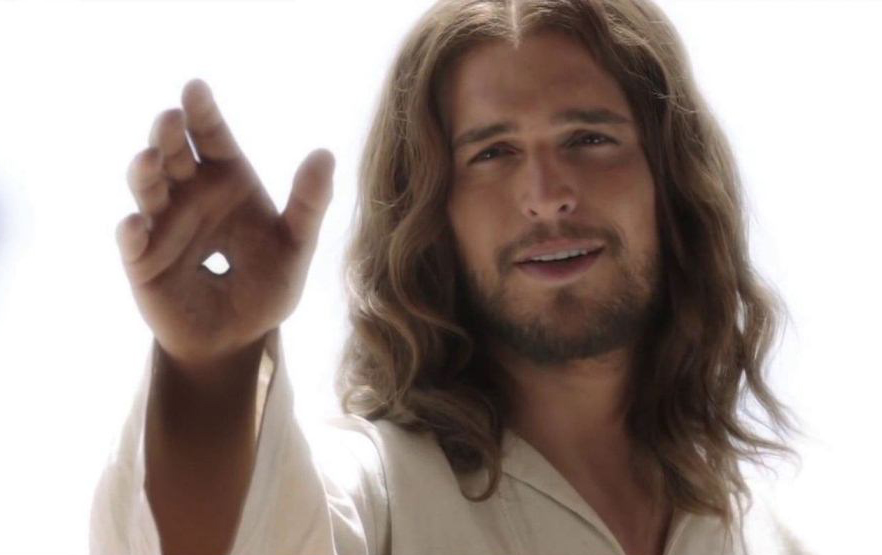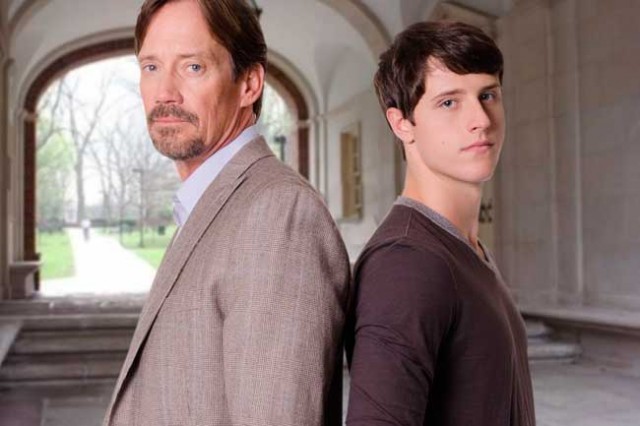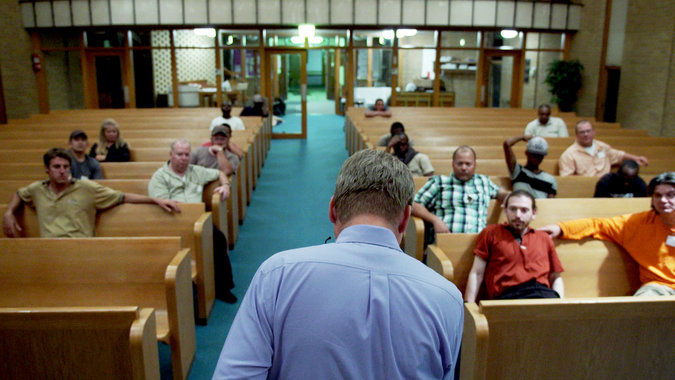We celebrate the end of the year the only way we know how: through lists, essays, and mixes. Join us as we explore the music and films that helped define the year. More from this series
Here at TMT Headquarters, we receive a lot of pleas and pitches from filmmakers and production companies. While perusing through my emails from editors, only one has ever stood out and made me think about anything beyond the film in question. The press release was sent by the Utah-based producers of Wayward, a contemporized revision of the Prodigal Son parable:
With the success of faith-based box office hits like “God’s Not Dead” ($61 million box office) and “Heaven Is For Real” ($91 million box office), one might think that everyone loves faith-based movies. Critics and audiences, however, are not always on the same page. RottenTomatoes.com, a website offering film approval ratings and viewing advice, published opinions about last year’s faith-based movies that oppose those of their audiences. A quote or two from Mark Twain comes to mind: “The public is the only critic whose opinion is worth anything at all,” or, “I believe that the trade of critic, in literature, music, and the drama, is the most degraded of all trades, and that it has no real value — certainly no large value.” For example, “Son of God” received only a 21 percent approval rating from critics and yet a 74 percent approval rating from audiences. Similarly, “God’s Not Dead” received a paltry 17 percent approval rating from critics while an astounding 83 percent of audiences approved of the movie. “Heaven Is For Real” did better with critics (46 percent approval rating) but much higher with audiences (71 percent approval rating). “Meet The Mormons” received 1 nod out of 9 reviews while the public that reviewed it on Rotten Tomatoes approved it by 92 percent.
When I first read it, I was appalled. This attempt to appeal to critics was a middle finger poking below the belt. Who did this hack think he was fooling? But as my editor pointed out to me, maybe there’s some truth to it, and after viewing and researching the many faith-based films of 2014, I realized that it was true: critics don’t just “not get” these films; they outright loathe them.
I can commiserate; viewing the aforementioned faith-based films, and many others, was a grueling process I wouldn’t project upon anyone. When I finally saw the last film on my list, Kirk Cameron’s Saving Christmas, I felt like a squandered month’s worth of tongue-biting was purged via gleefully maniacal (or maniacally gleeful) laughter. These films are condescending, manipulative, hokey, occasionally offensive, and financially successful. The press release, however, nudges forth a wholly depressing truth: in any mainstream genre, not specifically Christian, the audience always wins, yet no other genre’s prosperity from a given year has so strongly reminded me of how true that statement is.
2014 is the most successful year for faith-based cinema in a decade, and no amount of negative reviews can change that.
The Number Games
 Still from Randall Wallace’s “Heaven Is For Real”
Still from Randall Wallace’s “Heaven Is For Real”
According to Box Office Mojo, three films from 2014 cracked the top 10 Christian films list: Heaven Is For Real, God’s Not Dead, and Son of God (numbers 5-7, respectively). In the top 20 were When the Game Stands Tall (#12), Left Behind (#14), and Mom’s Night Out (#19). A total of 14 films from 2014 were in the top 100, pulling in a domestic sum of ~$275 million, the highest in 10 years, not counting the Disney-produced Narnia films. (The #1 film remains Mel Gibson’s The Passion of the Christ at ~$300 million, or about ~$600 worldwide, so let’s consider it a tough act to follow.) Even major studios got in on the fun: 20th Century Fox and Sony distributed Son of God and Heaven Is For Real (the latter being an opportunity to plug Spider-Man). Although not made by or for Christians, Darren Aronofsky’s Noah reignited the biblical epic (without a Steve Carell in sight) to the tune of $325 million worldwide, and we’re still awaiting Ridley Scott’s Exodus, a big-budget retelling of the Moses saga, to arrive this month.
Meanwhile, non-mainstream arthouse films about faith and religion came and went: Nothing Bad Can Happen, Calvary, and The Overnighters. Unbothered with cornering a market, these outliers represent the ever present, striking contrast. Unlike the mainstream fare, these films weren’t swimming in the self-righteous fantasia most Christian films portray; these were real downer jams that graced the surface before plunging into the unplumbed depths of human misery. Each of their protagonists met some sort of doom in the end, with the morals and lessons learned being harsh and pragmatic. In short, these films didn’t stand a chance to share the same successes as their crowd-pleasing adversaries. These pictures would play at film festivals with weird words like “Cannes” and later in “fruity” metropolises to the drooling smarty-pants four-eyed goons. Out of my window, I can almost hear the Gregorian chant of “suck it” emitting from the Christian studios’ offices.
Christian Films Are Horrifying
 Still from Christopher Spencer’s “Son of God”
Still from Christopher Spencer’s “Son of God”
I’m struck by how similar the Christian and horror genres are, and not just because when they achieve astronomic receipt numbers, it’s often in spite of critical consensus. Both thrive on independent productions and studio releasing. Both have a vibrant home video market. Both share an interest in afterlife mythology. Both genres are ripe for crossover (Blood Freak, The Exorcist, this year’s The Remaining). Both have a fascination in and fear of the unknown. To get more specific, the heavenly dimpled witness in Heaven Is For Real speaks more articulately than most 40 year olds when he’s not smiling like The Omen’s Damien. Kirk Cameron’s Saving Christmas is padded with slow-motion dancing little girls and face-first nosedives into presents that wouldn’t look out of place in a Lynchian nightmare.
There’s even something to be said about the way both genres validate violence, whether self-inflicted or outward, in the name of good: The glorification of Christ’s death as a reason for faith. Father Karras’s violent suicide in The Exorcist. The daughter in Heaven Is For Real punching a pair of playground bullies, a move doted on by her pastor father. One of Saving Christmas’s major points is the validation of St. Nicholas, who kicked ass for the Lord, justified by Cameron shrugging, “There was no time for political correctness back then.”
Most notably, both genres thrive on reboots and the perpetuation of familiar characters. Son of God (dir. Christopher Spencer), the first Christian-produced hit of the year, is also the first Jesus-centric theatrical release since The Passion. Pieced together from 2013’s wildly successful The Bible miniseries, Son returns the Christ story to a vanilla 0-90 demographic friendliness. Some writers remarked on producers Mark Barnett’s and Roma Downey’s (who plays Jesus’s mother Mary) opportunism in filling the void in theatrical Christian entertainment, its wide releases few and far between. As television gains cinema-quality entertainment, why not capitalize off it? They did, and they saw that it was good.
If Gibson’s take on Christ fetishized exploitation-level gore, then Spencer reclaims its wholesomeness, rescuing its young audience from early-onset trauma. Downey and Barnett focus on the miracles and selflessness that led him to martyrdom, not the gory details. It was a creative step backward for this slate-cleansing epic, and churchgoers were so OK with it that, after a long absence, they gladly forked over $67 million worldwide. Not bad for a film made for only $22 million.
Text Everyone You Know: Criticism Is Not Dead
 Promotional image for Harold Cronk’s “God’s Not Dead”
Promotional image for Harold Cronk’s “God’s Not Dead”
Critics were less impressed. The typical heavy handedness they’d come to despise was beyond stale and derivative, and once you’ve seen and enjoyed Willem Defoe in Scorsese’s The Last Temptation of Christ, you tire of a confident, undoubting Jesus. The very negatives that critics bemoaned seemed exactly what audiences wanted: faith-affirming celebration for the whole family. Darren Aronofsky’s gritty special-effects epic Noah fared better with critics and overseas markets, pulling in only $100 million domestically, but Son of God’s success is more impressive because of its niche marketing and demand from American audiences. Even though Noah’s numbers were higher, Son of God made more than triple its budget back, while Noah made just under that much. Plus, Son of God was strategically released one month before Noah, creating a battle of Biblical proportions: the Christian literalism vs. the atheist-helmed revisionism.
As impressive as Son of God’s success was, it couldn’t compare to its closest allies: the contemporary morality plays, the most frequented sub-genre of the Christian film industry. Released one week before Noah, God’s Not Dead (dir. Harold Cronk; released by Pure Flix, the people who brought you Holyman Undercover) became the most panned extra-padded religious debate of 2014. When critics want an example of Christian cinema at its meanest, smuggest, and hokiest, here’s their greatest proof. It’s essentially Sunday school-ready Oscar-bait: a young, unwavering Christian (Shane Harper) debates God’s existence with a pretentious philosophy professor (Kevin Sorbo), told through Magnolia-style “everything is connected” interweaving, reaching its climax when every student stands up, one by one, to declare, “God is not dead.” Oh, and then Sorbo gets fatally hit by a car and only dies after accepting Christ when receiving his last rites (yet another instance in which violence is perpetrated to serve the message). As if it couldn’t be more imposing, the film ends with some words of encouragement flashing across the screen: “Text everyone you know - ‘God’s Not Dead.’” Clearly, the filmmakers made the assumption that its entire audience and everyone they knew would be receptive to such a text. Because, I mean, come on — nobody would be offended by that. It just raises the film’s thesis that not only should you believe there’s a God, but there’s no room for agreeing to disagree.
Admittedly, I’ve struggled between applauding these films for their commercial breakthroughs and putting them down as many film critics are wont to do. In a way, I have to admire these films and the audiences who keep returning to them. Like with Son of God, it’s clear to see why God’s Not Dead made $60 million on a $2 million budget: the end credits list the dozens of true cases in which college students sparred with faculty over their faith. Perhaps it resonated with young people eager to defend their faith but lack the know-how. Let’s face it: it’s difficult to defend your beliefs once you enter the real world. In a culture where Seth MacFarlane is attacking religion via network television every Sunday, it’s refreshing to see a faith-affirming contemporary film achieve mainstream success. Sure, the world it portrays features no kissing, sex, vulgarity, or impulsive violence, but people have a right to escape reality. They’re no different than most other filmgoers.
Sony’s evangelical Heaven Is For Real (dir. Randall Wallace; from the studio that brought the surprise hits Courageous and Fireproof) wasn’t as intensely polarizing as God’s Not Dead; the reaction seemed an even mix. It benefits from better-etched characters than in God’s Not Dead (Complex human beings! With real doubts and sexual urges!), a lightly funny screenplay (even though the lead child says things too creepily articulate for a five year old), and has an admirable faith in its potentially-exaggerated story. Based upon Pastor Todd Burpo’s 2010 best-selling story, Heaven tells the pastor’s (Greg Kinnear) spiritual journey after his four-year-old son Colton sees Heaven in a near-death experience (he also sees his family members, present and past, including his still-born baby sister). Just as in God’s Not Dead, these “true-story” accounts can only be taken on a case-by-case basis, but in the end, it’s all asserted as “you just gotta believe” corniness that tends to rub critics the wrong way. And justifiably so: the film inhabits the same insular bubble that God’s Not Dead lives in, with faulty attempts at realism that only exist in the ideals of its believers. And yet, once again, that urge to believe in the impossible is infectious enough to earn over $100 million, no doubt helped by a wider release than its peers. Keith Phipps put it best: “[If] the story a 4-year-old pieces together bit by bit over the course of months can’t be believed, what can?”
Of course, not every Christian film can be as lucky. There are still plenty of faith films that have yet to make their money back or even break the internet with positive feedback. That’s what Kirk Cameron tried to do in his attempt to prove the critics were wrong about his latest stoned-on-life musings showcase, Kirk Cameron’s Saving Christmas (dir. Darren Doane). Much like last year’s Unstoppable, Saving Christmas is a 90-minute long vanity plate (with only 45 minutes of substantial material) in which the handsome, sweater-loving, hot chocolate-sipping “bro” glad-hands his way through a garland of validations for secular Christmas traditions: Christmas trees (the garden of Eden had life-giving trees!), the nativity scene (the swaddling clothes is the same as the funeral cloth!), and assorted other “Pagan” trinkets. These patronizing life lessons come in the form of him telling how much his Grinchy brother-in-law Christian (played by Doane) is simply wrong for disliking the commercial aspects of Christmas. He even manages to assume that poo-pooers find “suggestive” imagery in candy canes, which, I gotta hand it to him, I never saw coming.
Vulgarity, Abusiveness, and Low Receipts: Welcome to The Arthouse
 Still from Jesse Moss’s “The Overnighters”
Still from Jesse Moss’s “The Overnighters”
So what about more serious-minded arthouse releases? The Irish film Calvary (dir. John Michael McDonagh) and its German cousin Tore tzant (Nothing Bad Can Happen; dir. Katrin Gebbe) strip away the glossy ideals of many faith-based films, adding back the vulgarity and abusiveness that many true believers actually endure. In the former, a greying priest struggles to keep his Irish community together as the threat of murder hangs over his head. In the latter, a young Christian punk, sensing hypocrisy and alienation from his commune, falls into the trap of an abusive patriarch, whose family seems equally helpless against his brutishness. Both films end in the death of their faith-tested protagonists. The struggles with keeping the faith aren’t spelled out, which provides more realism and lack of compromise, and ultimately less mainstream appeal than a Pure Flix offering. In many ways, the films often feels like a subtle critique of the genre itself: it portrays passionate, oppressive faith as alien, almost laughable behavior to non-churchgoers; the patronizing and manipulation happens between the characters rather than toward the audience. It’s actually one of two faith-themed films released this year by Drafthouse Films, an extension of the Alamo Drafthouse Cinema that prides itself on releasing “provocative, visionary and artfully unusual films new and old from around the world.”
The Overnighters (dir. Jesse Moss), the other Drafthouse release, is the lonely documentary in the bunch. It’s also the most celebrated. It even has a premise that suggests a Christian-produced film: congenial Lutheran pastor attempts to house the homeless influx of oil workers in his small town North Dakota church, facing disfavor from his parish and the stripping of his title. Although not quite as grisly as its fictional brethren, the harsh reality of The Overnighters provides a lesson Christian audiences go to the cinema to escape: sometimes faith is not enough to guarantee survival.
But as high as their critical reception gets, their receipts remain staggeringly low, a fate most limited releases suffer. Calvary remains the highest grossing of the bunch with $3.5 million. The Overnighters is a distant second by $84,000, a portion of which is directed toward housing charities. Nothing Bad couldn’t even crack five grand.
A Personal Note
 Still from Katrin Gebbe’s “Nothing Bad Can Happen”
Still from Katrin Gebbe’s “Nothing Bad Can Happen”
There’s one portion I haven’t addressed. It’s actually at the very beginning, just above my byline. The reason I use “weird” in this piece’s subtitle is multi-faceted: first, the phenomena of the fledgling Christian film industry’s success in spite of its low critical regard, the kind usually found at the crossroads; second, the content itself (I haven’t even begun to describe the asinine The Identical, which must be experienced rather than read about); third, the odd timing in which both Christian-produced and non-Christian-produced stories appeared in steady succession; and fourth (and perhaps weirdest of all), the employment of the most evil form of mind trickery.
This is something that Catholic teaching has inflicted on me before. You see, I spent 13 years in Catholic school, from kindergarten at St. Thomas to graduation from St. Joseph’s High School. Then and now, I’m insecure, lanky, and introverted. The kind whose vocation is, occasionally, film criticism. So when I read the Wayward email during the process of writing this feature, High School Max (that’s my real name) came back. He wrote and rewrote different drafts. He cowered from poking fun. He caved. He carefully made sure to oblige the more knowledgeable Christian film producers. Then I realized something: there wasn’t anything wrong with my approach. I only allowed there to be a problem because my insecurities had been preyed on. I allowed myself to be manipulated into guilt, the way the church often does with its stories. I tried to play devil’s advocate when giving these films justice. I was allowing my craft to be degraded by somebody else’s claim.
From October 2013 until August 2014, I was trapped in a writer’s ennui. With no real outlet or motivation for writing, I made sure to not take my precious opportunity to write for TMT for granted. So even though I feel a pang of guilt for often snarkily criticizing a film when I worry about it wasting not just my own time, but also that of the other critics who have to pay attention to it, I feel like I owe something to them. At best, criticism is for other critics to read, to be inspired by. We’re just so passionate we hate to see our time wasted, and we hate to see audiences be pandered to rather than challenged, even if patronizing content is ultimately what some audiences want. If so, great. We all gotta get pleasure some way in the short time on this godforsaken rock.
Therefore, I’d like to end this feature with a skill I’ve retained after all these years of schooling:
Dear Christian Film Industry,
I’d like to thank you for giving me the chance to see your way. Through the miracle of technology, an impressive feat of man’s tenacity and intelligently designed gifts, you’ve been able to show me a vast variety of your own works of art. I am thankful that the good Lord, a powerful force that I still have faith in, the force that I often turn to in my darkest moments, has granted your abilities to move strangers from around the world to a higher degree of emotion. You’ve made people laugh. You’ve made people cry. You’ve given hope in the weighed-down hearts of your audience. Most people have done worse things in order to achieve that. Of course, you’ve also cornered an even more destructive tool: the power of manipulating guilt and regret in the hearts of your enemies. I’m sure you thought you had good intentions, but as your great spokesman Ned Flanders once said, “My family and I can’t live in good intentions.” So nice try, best of luck with your efforts, and may God have mercy on your soul, forever and ever. Amen.
Love,
Max
We celebrate the end of the year the only way we know how: through lists, essays, and mixes. Join us as we explore the music and films that helped define the year. More from this series
